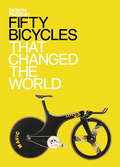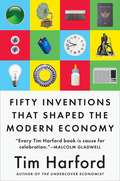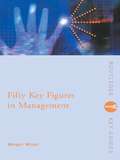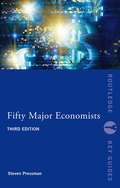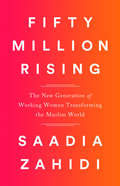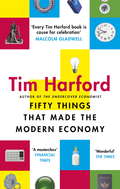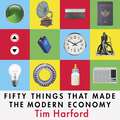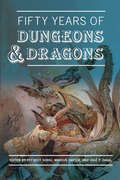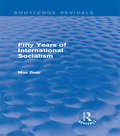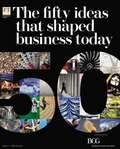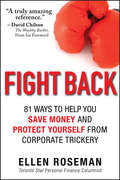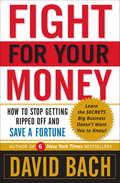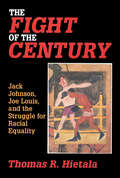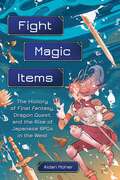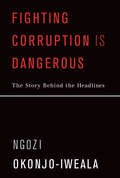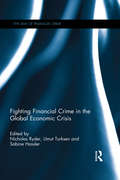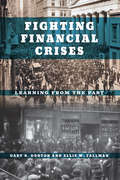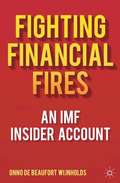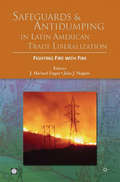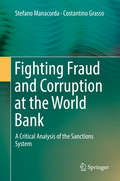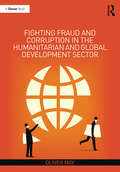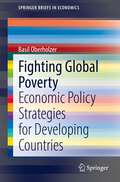- Table View
- List View
Fifty Bicycles That Changed the World: Design Museum Fifty (Design Museum Fifty Ser.)
by Alex NewsonThe Design Museum brings you fifty bicycles that changed the world we live in!The bicycle is the world's most popular form of transport. From the penny-farthing, the Dandy-horse and the Velocipede the design of the bicycle has evolved over the decades both in terms of style and technology. From high-performance cycles to practical run-arounds, conceptual bikes to commercial models, Alex Newson explores the 50 most important, pivotal bicycles from around the world.The bicycle is the world's most popular form of transport. From the penny-farthing, the Dandy-horse and the Velocipede the design of the bicycle has evolved over the decades both in terms of style and technology. From high-performance cycles to practical run-arounds, conceptual bikes to commercial models, here are the 50 most important, pivotal bicycles from around the world.Contents Includes...Laufmaschine c.1817Velocipede c.1863Safety Bicycle c.1880The tandem 1898The cargo bike 1900sBSA 3-Speed Hub 1930-40Flying Pigeon PA-02 c.1950PARIS Galibier c.1947 Raleigh Chopper 1969Dawes Galaxy 1971Avatar 2000 1980AM series Moulton Bicycle 1983STRiDA 1985Kestrel 4000 1986'Old Faithful' 1993Airnimal Chameleon c.2000Bianchi Pista Chrome 2007EADS Airebike 2011Faraday Porteur 2013...And Much More!
Fifty Bicycles That Changed the World: Design Museum Fifty (Design Museum Fifty)
by Alex NewsonThe Design Museum brings you fifty bicycles that changed the world we live in!The bicycle is the world's most popular form of transport. From the penny-farthing, the Dandy-horse and the Velocipede the design of the bicycle has evolved over the decades both in terms of style and technology. From high-performance cycles to practical run-arounds, conceptual bikes to commercial models, Alex Newson explores the 50 most important, pivotal bicycles from around the world.The bicycle is the world's most popular form of transport. From the penny-farthing, the Dandy-horse and the Velocipede the design of the bicycle has evolved over the decades both in terms of style and technology. From high-performance cycles to practical run-arounds, conceptual bikes to commercial models, here are the 50 most important, pivotal bicycles from around the world.Contents Includes...Laufmaschine c.1817Velocipede c.1863Safety Bicycle c.1880The tandem 1898The cargo bike 1900sBSA 3-Speed Hub 1930-40Flying Pigeon PA-02 c.1950PARIS Galibier c.1947 Raleigh Chopper 1969Dawes Galaxy 1971Avatar 2000 1980AM series Moulton Bicycle 1983STRiDA 1985Kestrel 4000 1986'Old Faithful' 1993Airnimal Chameleon c.2000Bianchi Pista Chrome 2007EADS Airebike 2011Faraday Porteur 2013...And Much More!
Fifty Inventions That Shaped the Modern Economy
by Tim HarfordA lively history seen through the fifty inventions that shaped it most profoundly, by the bestselling author of The Undercover Economist and Messy. Who thought up paper money? What was the secret element that made the Gutenberg printing press possible? And what is the connection between The Da Vinci Code and the collapse of Lehman Brothers? Fifty Inventions That Shaped the Modern Economy paints an epic picture of change in an intimate way by telling the stories of the tools, people, and ideas that had far-reaching consequences for all of us. From the plough to artificial intelligence, from Gillette’s disposable razor to IKEA’s Billy bookcase, bestselling author and Financial Times columnist Tim Harford recounts each invention’s own curious, surprising, and memorable story. Invention by invention, Harford reflects on how we got here and where we might go next. He lays bare often unexpected connections: how the bar code undermined family corner stores, and why the gramophone widened inequality. In the process, he introduces characters who developed some of these inventions, profited from them, and were ruined by them, as he traces the principles that helped explain their transformative effects. The result is a wise and witty book of history, economics, and biography.
Fifty Key Figures in Management (Routledge Key Guides)
by Morgen WitzelFifty Key Figures in Management is a collection of biographies of fifty people who have helped to make management what it is today - through their ideas, writings and teachings, through practical example and leadership, or both. Featuring business leaders such as Henry Ford, Jack Welch and Bill Gates, all of whom were pioneers in business pratice, the book also includes thinkers and consultants who have helped to redefine the way we think about management, such as Ohmae Kenichi, Fukuzawa Yukichi, Tom Peters and Charles Handy. Moreover, new and emerging aspects of management are covered through the inclusion of such cutting-edge thinkers as Arie de Geus, Max Boisot and Nonaka Ikujiro. Taken together, the fifty biographies presented here described how management emerged as a modern discipline and grew into its present form. Organization, strategy, marketing, production management, human resource management and knowledge management all come together to show how management is a multi-faceted discipline.
Fifty Major Economists: Fifty Major Economists (Routledge Key Guides)
by Steven PressmanAn introduction to the life, work and ideas of the people who have shaped the economic landscape from the sixteenth century to the present day. Now in a third edition, it considers how major economists might have viewed challenges such as the continuing economic slump, high unemployment and the sovereign debt problems which face the world today, it includes entries on: • Paul Krugman • Hyman Minsky • John Maynard Keynes • Adam Smith • Irving Fisher • James Buchanan Fifty Major Economists contains brief biographical information on each featured economist and an explanation of their major contributions to economics, along with simple illustrations of their ideas. With reference to the recent work of living economists, guides to the best of recent scholarship and a glossary of terms, Fifty Major Economists is an ideal resource for students of economics. Steven Pressman is Professor of Economics and Finance at Monmouth University. He has published around 120 articles in refereed journals and as book chapters, and has authored, or edited 13 books, including Women in the Age of Economic Transformation, Economics and Its Discontents, Alternative Theories of the State, and Leading Contemporary Economists.
Fifty Million Rising: The New Generation of Working Women Transforming the Muslim World
by Saadia ZahidiAcross the Muslim world, ever greater numbers of women are going to work. In the span of just over a decade, millions have joined the workforce, giving them more earning and purchasing power and greater autonomy.In Fifty Million Rising, award-winning economist Saadia Zahidi illuminates this discreet but momentous revolution through the stories of the remarkable women who are at the forefront of this shift--a McDonald's worker in Pakistan who has climbed the ranks to manager; the founder of an online modest fashion startup in Indonesia; a widow in Cairo who runs a catering business with her daughter, against her son's wishes; and an executive in a Saudi corporation who is altering the culture of her workplace; among many others. These women are challenging familial and social conventions, as well as compelling businesses to cater to women as both workers and consumers. More importantly, they are gaining the economic power that will upend entrenched cultural norms, re-shape how women are viewed in the Muslim world and elsewhere, and change the mindset of the next generation.Inspiring and deeply reported, Fifty Million Rising is a uniquely insightful portrait of a seismic shift with global significance, as Muslim women worldwide claim a seat at the table.
Fifty Things that Made the Modern Economy
by Tim HarfordBased on the series produced for the BBC World ServiceWho thought up paper money? How did the contraceptive pill change the face of the legal profession? Why was the horse collar as important for human progress as the steam engine? How did the humble spreadsheet turn the world of finance upside-down?The world economy defies comprehension. A continuously-changing system of immense complexity, it offers over ten billion distinct products and services, doubles in size every fifteen years, and links almost every one of the planet's seven billion people. It delivers astonishing luxury to hundreds of millions. It also leaves hundreds of millions behind, puts tremendous strains on the ecosystem, and has an alarming habit of stalling. Nobody is in charge of it. Indeed, no individual understands more than a fraction of what's going on. How can we make sense of this bewildering system on which our lives depend?From the tally-stick to Bitcoin, the canal lock to the jumbo jet, each invention in Tim Harford's fascinating new book has its own curious, surprising and memorable story, a vignette against a grand backdrop. Step by step, readers will start to understand where we are, how we got here, and where we might be going next.Hidden connections will be laid bare: how the barcode undermined family corner shops; why the gramophone widened inequality; how barbed wire shaped America. We'll meet the characters who developed some of these inventions, profited from them, or were ruined by them. We'll trace the economic principles that help to explain their transformative effects. And we'll ask what lessons we can learn to make wise use of future inventions, in a world where the pace of innovation will only accelerate.
Fifty Things that Made the Modern Economy
by Tim HarfordBased on the series produced for the BBC World ServiceA Financial Times and Bloomberg Business Week Book of the YearWho thought up paper money? How did the contraceptive pill change the face of the legal profession? Why was the horse collar as important for human progress as the steam engine? How did the humble spreadsheet turn the world of finance upside-down?The world economy defies comprehension. A continuously-changing system of immense complexity, it offers over ten billion distinct products and services, doubles in size every fifteen years, and links almost every one of the planet's seven billion people. It delivers astonishing luxury to hundreds of millions. It also leaves hundreds of millions behind, puts tremendous strains on the ecosystem, and has an alarming habit of stalling. Nobody is in charge of it. Indeed, no individual understands more than a fraction of what's going on. How can we make sense of this bewildering system on which our lives depend?From the tally-stick to Bitcoin, the canal lock to the jumbo jet, each invention in Tim Harford's fascinating new book has its own curious, surprising and memorable story, a vignette against a grand backdrop. Step by step, readers will start to understand where we are, how we got here, and where we might be going next.Hidden connections will be laid bare: how the barcode undermined family corner shops; why the gramophone widened inequality; how barbed wire shaped America. We'll meet the characters who developed some of these inventions, profited from them, or were ruined by them. We'll trace the economic principles that help to explain their transformative effects. And we'll ask what lessons we can learn to make wise use of future inventions, in a world where the pace of innovation will only accelerate.
Fifty Years After Bretton Woods: The Future of the IMF and the World Bank
by James M. Boughton K. Sarwar LateefA report from the International Monetary Fund.
Fifty Years of Dungeons & Dragons
by Premeet Sidhu, Marcus Carter, and José P. ZagalOn the fiftieth anniversary of Dungeons & Dragons, a collection of essays that explores and celebrates the game&’s legacy and its tremendous impact on gaming and popular culture.In 2024, the enormously influential tabletop role-playing game Dungeons & Dragons—also known as D&D—celebrates its fiftieth anniversary. To mark the occasion, editors Premeet Sidhu, Marcus Carter, and José Zagal have assembled an edited collection that celebrates and reflects on important parts of the game&’s past, present, and future. Each chapter in Fifty Years of Dungeons & Dragons explores why the nondigital game is more popular than ever—with sales increasing 33 percent during the COVID-19 pandemic, despite worldwide lockdowns—and offers readers the opportunity to critically reflect on their own experiences, perceptions, and play of D&D.Fifty Years of Dungeons & Dragons draws on fascinating research and insight from expert scholars in the field, including: Gary Alan Fine, whose 1983 book Shared Fantasy remains a canonical text in game studies; Jon Peterson, celebrated D&D historian; Daniel Justice, Canada Research Chair in Indigenous Literature and Expressive Culture; and numerous leading and emerging scholars from the growing discipline of game studies, including Amanda Cote, Esther MacCallum-Stewart, and Aaron Trammell. The chapters cover a diverse range of topics—from D&D&’s adoption in local contexts and classrooms and by queer communities to speculative interpretations of what D&D might look like in one hundred years—that aim to deepen readers&’ understanding of the game.
Fifty Years of International Socialism (Routledge Revivals)
by Max BeerFirst published 1935, this title presents a series of recollections, some intimately personal, others bearing on the great social, cultural and political issues that faced the Jews and the European population more generally during the first part of the twentieth century. The author specifically focuses on differing attitudes towards the rise of Socialism in Europe, and the fate of nineteenth-century politics in the face of the tumultuous revolutions and counter-revolutions that arose in the aftermath of the First World War.
Fifty ideas that shaped business today
by Financial Times"What makes a great business idea? How can we tell whether it will stand the test of time? And why do some new ideas have greater influence than others in shaping the environment that businesses operate in today?<P> These are the questions that a distinguided panel of judges have evaluated in drawing up a list of the 50 ideas that most shaped business today." -- from the Foreword
Fight Back
by Ellen RosemanMoney-saving advice from Canada's leading consumer advocateIn this book Ellen Roseman distills the financial advice she gives in her columns and blogs into 81 quick tips that all Canadians can use to help them spend sensibly, save money, and avoid costly consumer traps. This book of "personal finance greatest hits" is filled with illustrative examples and cautionary advice from Roseman and stories from her faithful readers. Filled with a wealth of information, the book includes the low-down on dealing with banks and car dealers, cutting costs of communication services, improving your credit, buying and renovating a home, fighting online fraud, ensuring you have the right insurance, and more.Offers an easy-to-use guide for being smart with your moneyIncludes how to advice on handling the most common financial pitfallsContains the best advice from Ellen Roseman's columns and blogsWritten by Canada's most popular and savvy consumer advocateDon't spend another dollar until you read Ellen Roseman's best-ever tips for saving money and making wise financial decisions.
Fight for Your Money: How to Stop Getting Ripped Off and Save a Fortune
by David BachThe bestselling author shows you how to protect your money and put thousands back in your pocket every year by taking on the “corporate machines” who are taking you to the cleaners. InFight For Your Money, David Bach, our favourite financial guru and consumer advocate, has written the ultimate guide to making smarter financial decisions and protecting yourself from companies who want to separate you from your hard-earned paycheque. Corporations earn billions annually from our financial ignorance. The time has come to fight back! Starting with an A to Z list of items where you are paying too much – your cell phone, cable bill, cars, credit cards, insurance, airfare, hotels and many more – Bach shows how you are being taken. Then the “Fight for Your Money Toolkit” shows you how to fight back, with sample letters, call scripts, and real-life stories of ordinary people who have fought back and won. As David Bach says, “When you are being taken financially, you work harder than you have to, for longer than you need to. When you fight for your money, you keep more of your hard earned paycheque and you spend your life doing what you really want to do. ”
Fight of the Century: Jack Johnson, Joe Louis, and the Struggle for Racial Equality
by Thomas R. HietalaThis is a revealing look at the history of race relations in the United States during the first half of the twentieth century portrayed through the lives and times of the first two African-American heavyweight boxing champions, Jack Johnson and Joe Louis. Incorporating extensive research into the black press of the time, the author explores how the public careers and private lives of these two sports figures both define and explain vital national issues from the early 1900s to the late 1940s.
Fight, Magic, Items: The History of Final Fantasy, Dragon Quest, and the Rise of Japanese RPGs in the West
by Aidan MoherTake a journey through the history of Japanese role-playing games—from the creators who built it, the games that defined it, and the stories that transformed pop culture and continue to capture the imaginations of millions of fans to this day.The Japanese roleplaying game (JRPG) genre is one that is known for bold, unforgettable characters; rich stories, and some of the most iconic and beloved games in the industry. Inspired by early western RPGs and introducing technology and artistic styles that pushed the boundaries of what video games could be, this genre is responsible for creating some of the most complex, bold, and beloved games in history—and it has the fanbase to prove it. In Fight, Magic, Items, Aidan Moher guides readers through the fascinating history of JRPGs, exploring the technical challenges, distinct narrative and artistic visions, and creative rivalries that fueled the creation of countless iconic games and their quest to become the best, not only in Japan, but in North America, too. Moher starts with the origin stories of two classic Nintendo titles, Final Fantasy and Dragon Quest, and immerses readers in the world of JRPGs, following the interconnected history from through the lens of their creators and their stories full of hope, risk, and pixels, from the tiny teams and almost impossible schedules that built the foundations of the Final Fantasy and Dragon Quest franchises; Reiko Kodama pushing the narrative and genre boundaries with Phantasy Star; the unexpected team up between Horii and Sakaguchi to create Chrono Trigger; or the unique mashup of classic Disney with Final Fantasy coolness in Kingdom Hearts. Filled with firsthand interviews and behind-the-scenes looks into the development, reception, and influence of JRPGs, Fight, Magic, Items captures the evolution of the genre and why it continues to grab us, decades after those first iconic pixelated games released.
Fighting Corruption Is Dangerous: The Story Behind the Headlines (The\mit Press Ser.)
by Ngozi Okonjo-IwealaA frontline account of how to fight corruption, from Nigeria's former finance minister Ngozi Okonjo-Iweala.In Fighting Corruption Is Dangerous, Ngozi Okonjo-Iweala has written a primer for those working to root out corruption and disrupt vested interests. Drawing on her experience as Nigeria's finance minister and that of her team, she describes dangers, pitfalls, and successes in fighting corruption. She provides practical lessons learned and tells how anti-corruption advocates need to equip themselves. Okonjo-Iweala details the numerous ways in which corruption can divert resources away from development, rewarding the unscrupulous and depriving poor people of services.Okonjo-Iweala discovered just how dangerous fighting corruption could be when her 83-year-old mother was kidnapped in 2012 by forces who objected to some of the government's efforts at reforms led by Okonjo-Iweala—in particular a crackdown on fraudulent claims for oil subsidy payments, a huge drain on the country's finances. The kidnappers' first demand was that Okonjo-Iweala resign from her position on live television and leave the country. Okonjo-Iweala did not resign, her mother escaped, and the program of economic reforms continued. “Telling my story is risky,” Okonjo-Iweala writes. “But not telling it is also dangerous.” Her book ultimately leaves us with hope, showing that victories are possible in the fight against corruption.
Fighting Fake Money: Plastic to the Rescue (Fountas & Pinnell LLI Purple #Level T)
by Kate ForsterFAKING IT. In Australia, criminal masterminds were making their own fake cash. People were becoming suspicious. How could they be sure that any money was genuine? Something had to be done. Find out how Australians outsmarted the criminals and changed money forever.
Fighting Financial Crime in the Global Economic Crisis (The Law of Financial Crime)
by Nicholas Ryder Umut Turksen Sabine HasslerMany commentators, regulatory agencies and politicians have blamed the risky behaviour of both financial institutions and their actors for the collapse of the United States sub-prime mortgage market which in turn precipitated the global 'Credit Crunch'. This edited volume explores how financial crime played a significant role in the global economic crisis. The volume features contributions from internationally renowned academic and practitioner experts in the field who pinpoint some of the most important facets of financial crime which have emerged over recent years. Key subjects include: the possibility of criminalising reckless risk-taking on the financial markets; the duty of banks to prevent money-laundering and corruption; the growth of the Shadow Banking System; and the manipulation of LIBOR by banks. The book illustrates the global nature of financial crime, and highlights the complex relationships between regulatory bodies, law enforcement agencies and private actors in the attempt to limit the harmful effect of white collar crime on the stability of the financial sector. This book will be of great use and interest to scholars, practitioners and students within the field of financial crime, banking and finance law, and international political economy.
Fighting Financial Crises: Learning from the Past
by Gary B. Gorton Ellis W. TallmanIf you’ve got money in the bank, chances are you’ve never seriously worried about not being able to withdraw it. But there was a time in the United States, an era that ended just over a hundred years ago, when bank customers had to pay close attention to the solvency of the banking system, knowing they might have to rush to retrieve their savings before the bank collapsed. During the National Banking Era (1863–1913), before the establishment of the Federal Reserve, widespread banking panics were indeed rather common. Yet these pre-Fed banking panics, as Gary B. Gorton and Ellis W. Tallman show, bear striking similarities to our recent financial crisis. Fighting Financial Crises thus turns to the past to better understand our uncertain present, investigating how panics during the National Banking Era played out and how they were eventually quelled and prevented. The authors then consider the Fed’s and the SEC’s reactions to the recent crisis, building an informative new perspective on how the modern economy works.
Fighting Financial Fires
by Onno de Beaufort WijnholdsA topical insider view of causes and consequences of financial crises since the Mexican collapse of 1995. The book includes a detailed exploration of recent and ongoing firestorms, including the near meltdown of the global financial system and the euro crisis and suggests ways to save the international financial and monetary system.
Fighting Fire With Fire: Safeguards and Antidumping in Latin American Trade Liberalization
by Julio J. Nogues J. Michael FingerUntil the 1990s, the main users of safeguards and antidumping laws were Australia, Canada, the European Union, and the United States. Since then, many countries have implemented such laws, leading to a proliferation in antidumping and safeguard activity across the world. This timely book documents the political economy surrounding the implementation of these laws in seven Latin American countries and provides details on the institutions created, implementation of the laws, and subsequent activity. It finds that, in the larger political context, antidumping and safeguards are a necessary quid pro quo to certain important sectors to obtain much more liberalized trade policies for the general economy.
Fighting Fraud and Corruption at the World Bank: A Critical Analysis Of The Sanctions System
by Stefano Manacorda Costantino GrassoThis book focuses on the World Bank’s sanctions system, which is an innovative instrument of global governance implemented by the leading multilateral development bank in order to impose penalties on legal entities and individuals that are involved in Bank-financed projects. Although similar regimes have also been implemented by other regional multilateral development banks, the World Bank’s legal framework is currently the most comprehensive one.The book offers a rich and detailed analysis of the sanctions system, presenting an in-depth examination of all the phases of its procedure with a special focus on key aspects such as the criteria for assigning liability to legal entities and corporate groups, as well as the World Bank’s jurisdictional reach over non-contractors. The book also explores the compatibility between the legal framework implemented by the Bank and the rule of law, the role of precedents, and the level of due process. It highlights the fact that the sanctions system is currently characterized by a lack of legal guarantees, and that there are compelling reasons for supporting the argument that due process safeguards should be applied to it in their entirety. To that end, the book conducts a thorough analysis of specific procedural aspects such as the right to a hearing, the right to evidence disclosure, the time limit regime, the standard of proof and shift of the burden of proof, the evidential value of a party’s silence, and the consistency and predictability of the World Bank’s sentencing practice. The study is conducted on the basis of a detailed and painstaking examination of the most relevant decisions taken by the Sanctions Board, providing the first-ever commentary on the World Bank’s case law.
Fighting Fraud and Corruption in the Humanitarian and Global Development Sector
by Oliver MayThere are an estimated 40,000 international Non-Government Organisations (NGOs), working in an enormous global aid industry; official development assistance alone reached £90bn in 2014. This is supplemented by huge voluntary giving – the UK public, for example, give around £1bn a year to overseas causes. These organisations face a unique challenge from fraud and corruption. Operating in the world’s most under-developed and fragile environments, with minimal infrastructure and trust-based cultures, the risk is high. And, being wholly reliant on donors and supporters for income, so are the stakes. Researchers make different estimates of the scale of the problem facing the sector. Some research implies that losses to the global aid budget caused by occupational fraud and abuse may be in the billions of pounds, while those to the British public's voluntary overseas donations could be in the tens of millions. For many sector professionals working in the developing world, these estimates are readily believable. Fighting Fraud and Corruption in the Humanitarian and Global Development Sector by Oliver May is a timely, accessible and relevant how-to guide, which explores the scale and nature of the threat, debunks pervasive myths, and shows readers how to help their NGOs to better deter, prevent, detect and respond to fraud and corruption.
Fighting Global Poverty: Economic Policy Strategies for Developing Countries (SpringerBriefs in Economics)
by Basil OberholzerThis book presents paths developing countries can pursue in order to reclaim their ability to take action and improve people’s living conditions in the long term. According to dominant economic theory, markets are the essential engines of growth and poverty reduction in developing countries. However, the track record so far is disappointing. On the other hand, poor countries, which are exposed to the dynamics of global capitalism, have little chance to implement alternative development strategies. Policy actions for a fairer income distribution or for more public investment run the risk of being punished by financial markets and capital flight. The book presents solutions to these issues, considering key economic foundations, and outlining feasible development strategies.It is, therefore, a must-read for policy-makers and practitioners working on fighting global poverty, as well as scholars and students of economics, interested in a better understanding of development economics, economic growth, and financial economics.
